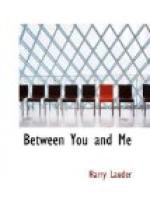All wasna sae richt and weel wi’ the world as we thought it in you days. We’d closed our een to much of bitterness and hatred and malice that was loose and seeking victims in the hearts of men. Aye, it was the Hun loosed the war upon us. It was he who was responsible for the calamity that overtook the world—and that will mak’ him suffer maist of all in the end, as is but just and richt. But we’d ha’ had trouble, e’en gi’en there’d been no war.
It wouldna ha’ been sae great, perhaps. There’d not be sae much grief and sae much unhappiness i’ the world today, save for him. But there was something wrang wi’ the world, and there had tae be a visitation of some sort before the world could be made better.
There’s few things that come to a man or a nation in the way of grief and sorrow and trouble that are no punishments for some wickedness and sin o’ his ain. We dinna always ken what it is we ha’ done. And whiles the innocent maun suffer wi’ the guilty—aye, that’s a part of the punishment of the guilty, when they come to realize hoo it is they’ve carried others, maybe others they love, doon wi’ them into the valley of despair.
I love Britain. I think you’ll all be knowing that I love my native land better than anything i’ the world. I’d ha’ deed for her gladly— aye, gladly. It was a sair grief tae me that they wadna tak’ me. I tried, ye ken? I tried even before the Huns killed my boy, John. And I tried again after he’d been ta’en. Sae I had tae live for my country, and tae do what I could to help her.
But that doesna mean that I think my country’s always richt. Far frae it. I ken only tae well that she’s done wrang things. I’m minded of one of them the noo.
I’ve talked before of history. There was 1870, when Prussia crushed France. We micht ha’ seen the Hun then, rearing himself up in Europe, showing what was in his heart. But we raised no hand. We let France fall and suffer. We saw her humbled. We saw her cast down. We’d fought against France—aye. But we’d fought a nation that was generous and fair; a nation that made an honorable foe, and that played its part honorably and well afterward when we sent our soldiers to fight beside hers in the Crimea.
France had clear een even then. She saw, when the Hun was in Paris, wi’ his hand at her throat and his heel pressed doon upon her, that he meant to dominate all Europe, and, if he could, all the world. She begged for help—not for her sake alone, but for humanity. Humanity refused. And humanity paid for its refusal.
And there were other things that were wrang wi’ Britain. Our cause was holy, once we began to ficht. Oh, aye—never did a nation take up the sword wi’ a holier reason. We fought for humanity, for democracy, for the triumph of the plain man, frae the first. There are those will tell ye that Britain made war for selfish reasons. But it’s no worth my while tae answer them. The facts speak for themselves.




